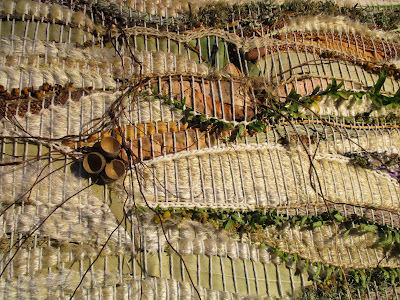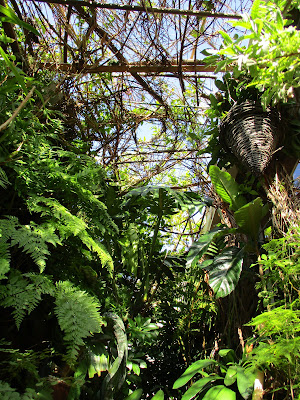

"More than conversation at the interface, it is creative assemblages like these that explore and elaborate the particular dynamic capacities that digital media afford and the ways that through them humans and machines can perform interesting new effects (...) in uniquely particular ways." Lucy Suchman (2009). Human-machine reconfigurations: plans and situated actions.
Feb 25, 2023
February

Jan 20, 2023
January
- A shift towards a more equitable and localized economy, where decision-making is decentralized and community-based.
- An emphasis on meeting basic needs, such as food, housing, healthcare, and education, rather than maximizing GDP.
- A reduction in the scale and pace of production and consumption, to minimize the depletion of natural resources and reduce the ecological footprint.
- A focus on regenerative and sustainable practices in agriculture, energy production, transportation, and other sectors.
- A decrease in the use of fossil fuels and an increase in the use of renewable energy sources.
- A reduction in the use of cars and an increase in the use of public transportation, cycling, and walking.
- A decrease in the use of pesticides and other chemicals in agriculture and an increase in the use of organic farming methods.
- Kate Raworth, economist and author of "Doughnut Economics: Seven Ways to Think Like a 21st-Century Economist."
- Jason Hickel, anthropologist and author of "The Divide: A Brief Guide to Global Inequality and Its Solutions."
- Tim Jackson, economist and director of the Centre for Real-World Learning at the University of Surrey, and author of "Prosperity Without Growth."
- Peter Victor, economist and author of "Managing Without Growth: Slower by Design, Not Disaster."
- Giorgos Kallis, ecologist and professor at the Autonomous University of Barcelona and author of "The Degrowth Alternative: for Environmental Sustainability and Social Equity."
It's important to note that while the idea of degrowth economy is still debated, and it's not a widely accepted concept yet. Some experts argue that it may not be practical or even possible to achieve, while others argue that it is necessary for the survival of the human race and the planet.
Photo by Monica Pinheiro free to use if you respect the license CC BY-NC-SA ( CC ).
Jan 15, 2023
January
Dec 21, 2022
December
"Only by altering our habits, and by endeavouring to live less exploitatively, can we prevent the changes to the environment from becoming an unparalleled catastrophe, another Great Dying. (...) People are understandably worried that it might lower our quality of life in the short term, and involve some personal and societal effort." Yet, "without our action at the level of community, of the nation, of the globe, we will certainly suffer even more. (...) we must enter into a more mutualistic relationship with our global environment. Only then can we preserve not just their infinite variety, but also our place within them" and "we too will live in hope." Thomas Halliday (2022). Otherlands: A World in the Making. Photos by Monica Pinheiro free to use if you respect the license CC BY-NC-SA ( CC ).
December
Dec 12, 2022
December
Dec 11, 2022
December
December
Nov 25, 2022
November
Nov 22, 2022
November
"Even in the stormiest sea, there is a calm that comes with staying true to your convictions." Harvard Business Review (2022). Energy and Motivation. Photo by Monica Pinheiro free to use if you respect the license CC BY-NC-SA ( CC ).
Oct 28, 2022
October
"There are certain fundamental rules that all ecosystems must follow. Energy, usually harnessed in from sunlight or, rarely, from the breakdown of minerals, must flow into the ecosystem to replace what is lost through activity and decay. The organisms that can access this energy are the producers, and those that cannot are the consumers, feeding on other living things in order to survive.” Thomas Halliday (2022). Otherlands: A World in the Making. Photo by Monica Pinheiro free to use if you respect the license CC BY-NC-SA ( CC ).
October
"Weaving is a transformative process with many functions. It involves clearing thought, and organizing personal energy and emotion. A handwoven work resists becoming mere product, or mere art." Sofi Thanhauser (2022). Worn: A People's History of Clothing.
Photo of tapestry (78 x 110 cm) by Monica Pinheiro free to use if you respect the license CC BY-NC-SA ( CC ).
Oct 13, 2022
Foodscapes
Oct 10, 2022
October
Oct 5, 2022
September
"Cloth can come from plants (cotton, linen), animals (sheep, silkworm), and, since the nineteenth century, from synthetic material and processes, namely plant-derived celulose liquefied and then extruded into strands (rayon) and various chemical recombinations of petroleum (nylon, spandex, polyester)." Sofi Thanhauser (2022). Worn: A People's History of Clothing. Photo by Monica Pinheiro free to use if you respect the license CC BY-NC-SA ( CC ).
Oct 4, 2022
October
"(...) it's not really about technology, but instead more about the quality of your life. (...) you'll come to realize that digital minimalism is much more than a set of rules, it's about cultivating a life worth living in our current age of alluring devices." Cal Newport (2020). Digital Minimalism: Choosing a Focused Life in a Noisy World. Photo by Monica Pinheiro free to use if you respect the license CC BY-NC-SA ( CC ).
Sep 23, 2022
September
"Because digital minimalists spend so much less time connected than their peers, its easy to think of their lifestyles as extreme, but the minimalists would argue that this perception is backward: what's extreme is how much time everyone else spends staring at their screens." Cal Newport (2020). Digital Minimalism: Choosing a Focused Life in a Noisy World. Photo by Monica Pinheiro free to use if you respect the license CC BY-NC-SA ( CC ).
Aug 29, 2022
August
Jul 18, 2022
The last layer
July
Jul 15, 2022
A Day Later set
Jorge Queiroz (2020). A Day Later 1, 2, 3, 4 e 5 (not in this order). Exposição «to go to», Calouste Gulbenkian.
Jul 14, 2022
February
July
Jun 21, 2022
June
"Craft makes us human, and in doing so, it can provide deep satisfactions that are hard to replicate in other (dare I say) less hands-on activities." Cal Newport (2020). Digital Minimalism: Choosing a Focused Life in a Noisy World. Photo by Monica Pinheiro (PT20220621). License CC BY-NC-SA ( CC ).
Jun 15, 2022
June
May 27, 2022
May
"Uma imagem, pintada, esculpida, fotografada, construída e emoldurada, é igualmente um palco, o local para uma encenação. O que o artista põe nesse local e o que o espectador vê encenado nele, empresta à imagem uma qualidade dramática, como se fosse capaz de prolongar a existência através de uma história cujo início o espectador perdeu e cujo final o artista desconhece." Alberto Manguel (2020). Ler Imagens: em que pensamos quando olhamos para arte.
Photo by Monica Pinheiro (STP20220527). License CC BY-NC-SA ( CC ).
May 26, 2022
May 25, 2022
May 24, 2022
May 22, 2022
May
May 21, 2022
May 3, 2022
May
Apr 18, 2022
April
Today it rung alarm bells, because tools are made available but education about tools is made short. You see, a tool can be a weapon if not properly used.
When we study ethnography we learn about ethics in research. We need to use strick protocols that guaranty access to the field of study, including the conditions under which we are going to collect information, and explicit and informed consent of those under study in the field. But if the tools are made available without requiring awareness of the need for complying with ethics and protocols, they open up huge risks by allowing unware people the use of those tools without complying with mandotory obligations for ethics and protocols!
The «right to use something» (in the case described in the paper ethnographic digital tools), needs also the awareness of the «obligations that allow us to use something» (in the case of the paper, the obligation to inform people that they are collecting all that information about them, in all those places). Rights and obligations are a combo that comes together. We can not use one without the other.
2022/April/18: text edited for clarity. Photo taken Abril 13, 2022, by Monica Pinheiro. You are free to use it if you respect the license CC BY-NC-SA ( CC ).


































